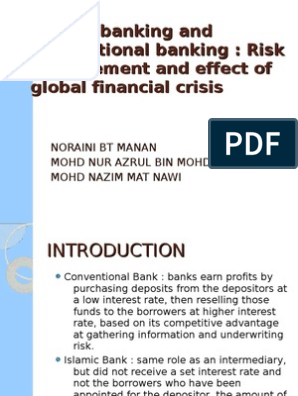100% found this document useful (1 vote)
249 views30 pagesIslamic Banking Fund Deployment
The document discusses various modes of deployment of funds by Islamic banks, including exchange-based contracts like Murabaha, Salam, and Istisna. Murabaha involves the bank purchasing goods for a client and reselling them at a markup. Salam allows prepayment for goods to be delivered later. Istisna is an agreement to manufacture goods according to a client's specifications. These contracts aim to comply with Islamic principles like risk sharing and avoiding interest.
Uploaded by
vivekananda RoyCopyright
© © All Rights Reserved
We take content rights seriously. If you suspect this is your content, claim it here.
Available Formats
Download as PPTX, PDF, TXT or read online on Scribd
100% found this document useful (1 vote)
249 views30 pagesIslamic Banking Fund Deployment
The document discusses various modes of deployment of funds by Islamic banks, including exchange-based contracts like Murabaha, Salam, and Istisna. Murabaha involves the bank purchasing goods for a client and reselling them at a markup. Salam allows prepayment for goods to be delivered later. Istisna is an agreement to manufacture goods according to a client's specifications. These contracts aim to comply with Islamic principles like risk sharing and avoiding interest.
Uploaded by
vivekananda RoyCopyright
© © All Rights Reserved
We take content rights seriously. If you suspect this is your content, claim it here.
Available Formats
Download as PPTX, PDF, TXT or read online on Scribd
/ 30









































































































